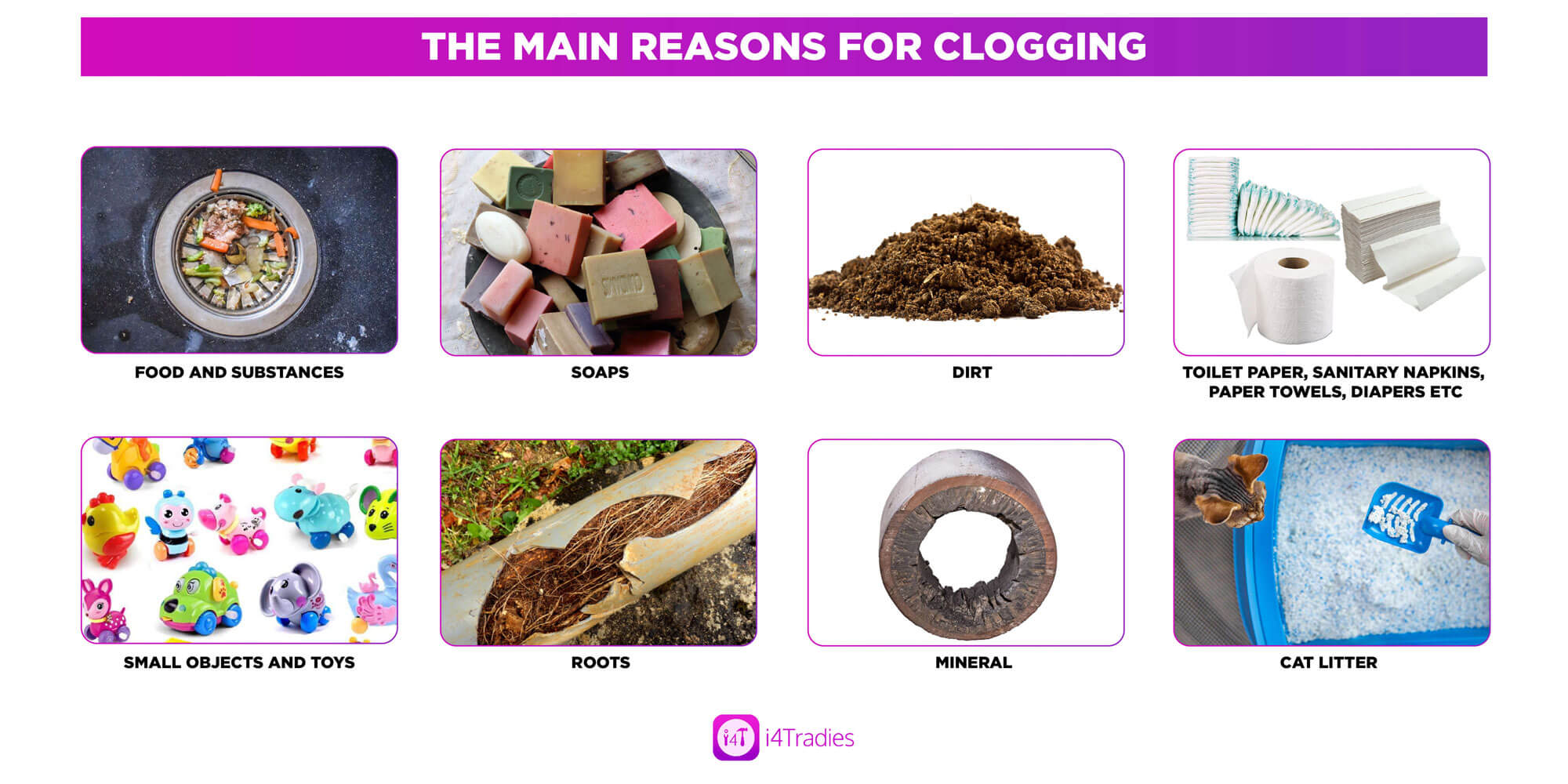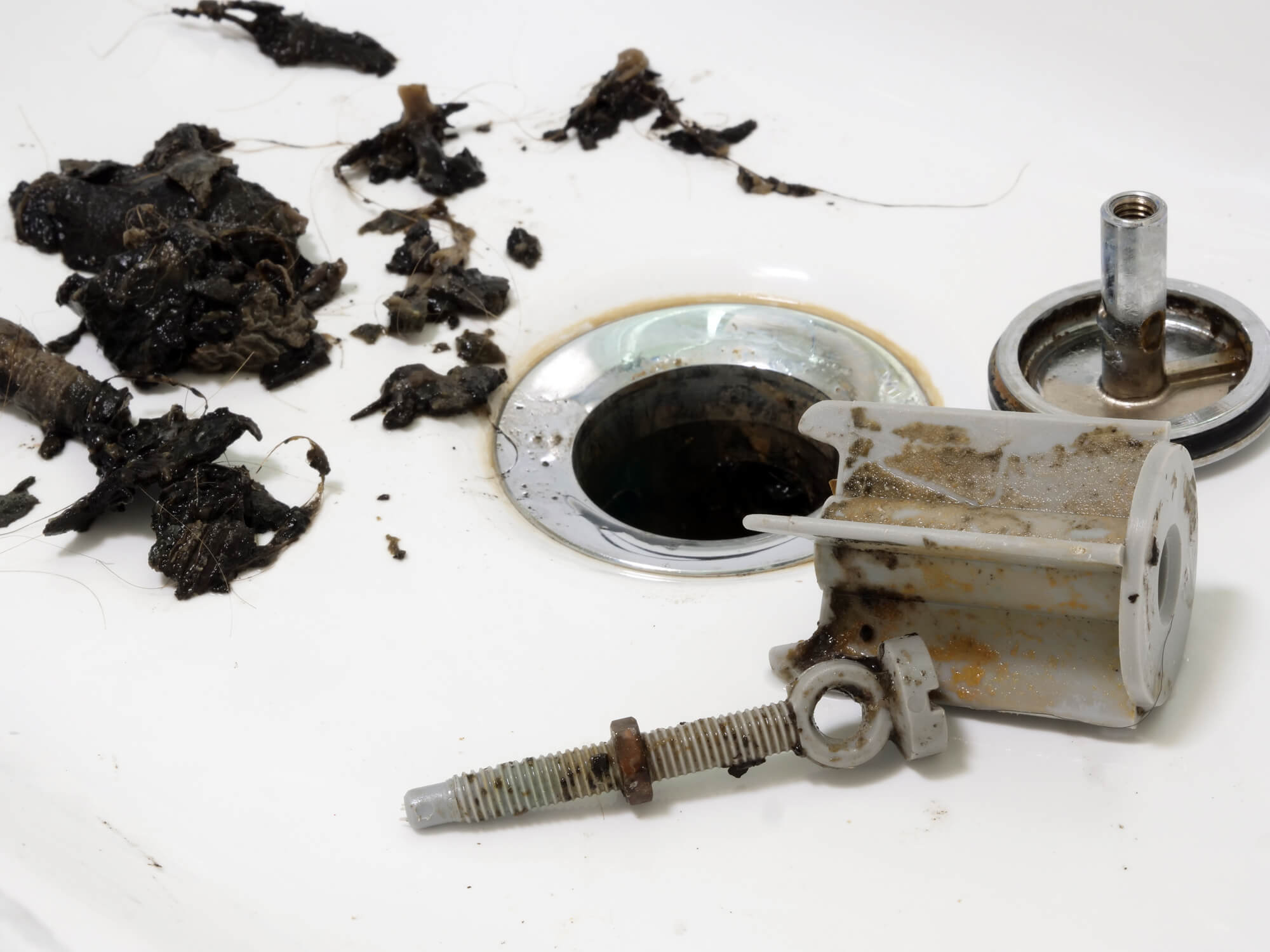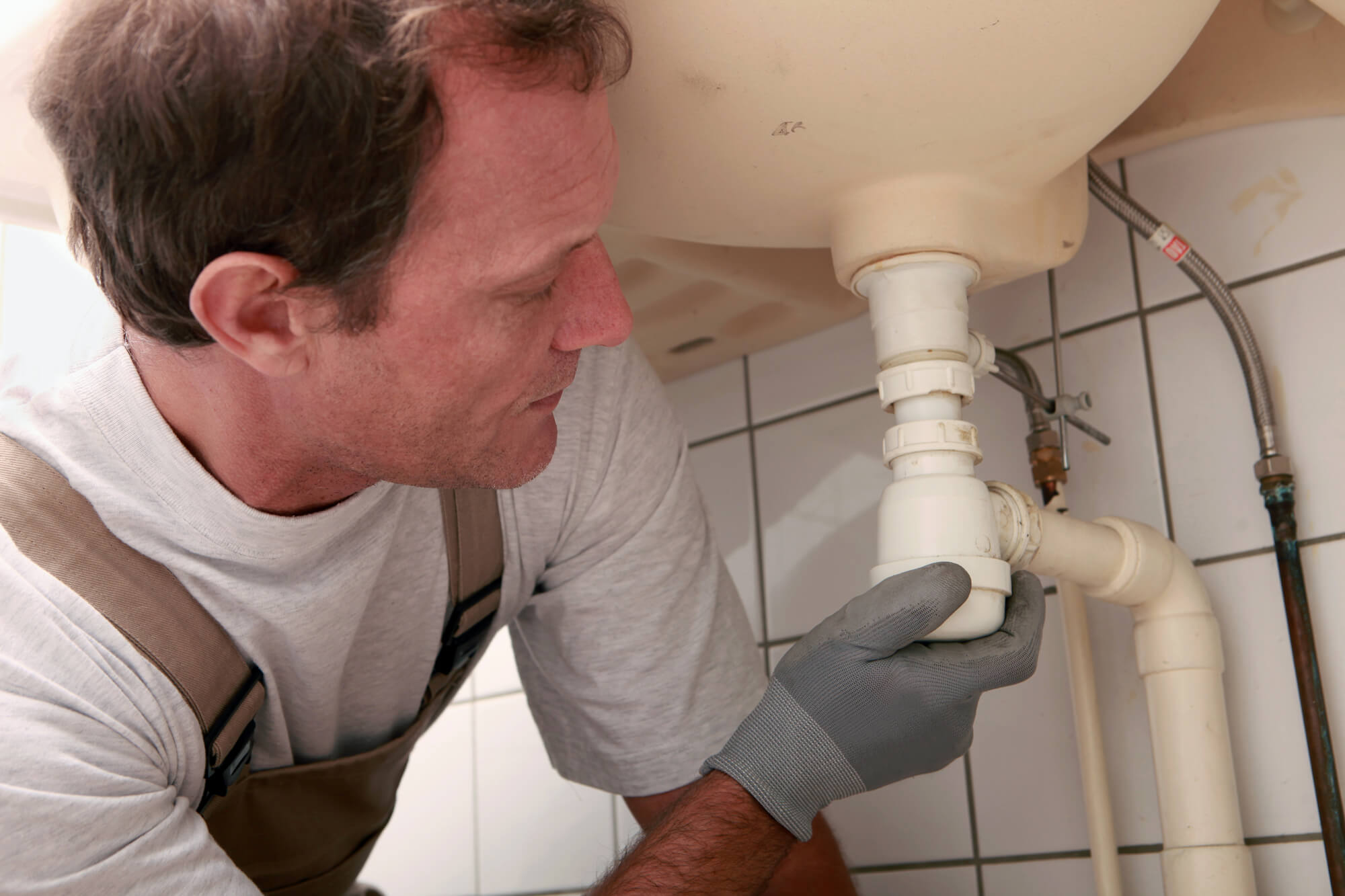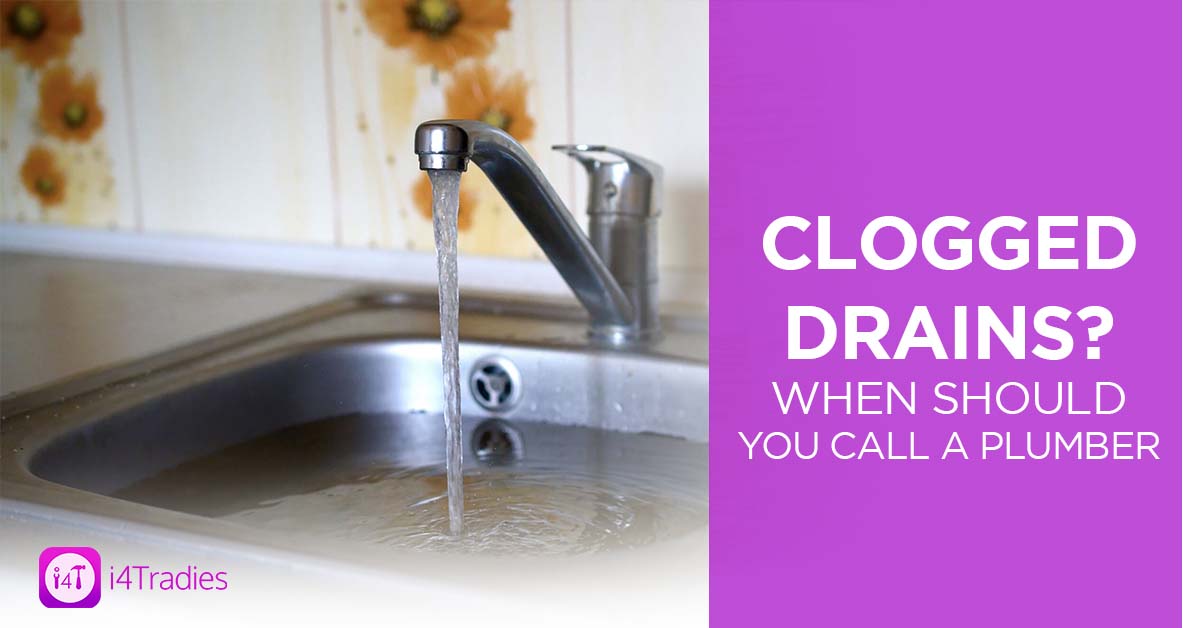From our luxurious sinks to our relaxing bathtubs, clogged drains are one of the most common plumbing issues that many homeowners have faced.
How do your home’s drains get clogged?
Many drain clogs occur due to a combination of things such as hair, dirt, mineral buildup etc. Clogged drains can be a minor or major plumbing issue in your property. It might start small and end up being an expensive fix for you, so you should detect the issue and prevent it before it gets any further.
A clogged drain can cause many issues in your home, such as slow water drainage, flooding or even costly repairs in the pipes and sewage. Recognising the causes and finding the solutions will help you avoid troubles in your home. Here are 8 household reasons why you get a clogged drain.
The main reasons for clogging

1. Food and Substances
Whether you have a garbage disposal in your sink or not, food that slips in your kitchen sink is going to cause much more trouble than you think. Fibrous food, tea leaves, coffee waste, eggshells, grease and oil are among the main reasons why you experience a blocked drain. These food and substances do not break down and in return cause build-ups in your pipe, resulting in a clogged drain.
Apart from the slow water drainage in your kitchen sinks, you will also start facing other issues such as inviting household pests. Instead of washing down your plates with food down the drain, use some kitchen tips to keep your sinks from clogging.
Tips and Fixes:
- Start plunging to unclog drains.
- Use detergent and hot water and pour it down the pipes, it will help break oil down in the pipes.
- Use a paper towel to absorb grease and oils before washing plates.
- Set up a composting pile.
- Use drain cleaning products.
- Call a professional plumber.
2. Soaps
The last thing you might think of when you have a blocked drain is soap! Soaps cause blockage in your pipes due to soap residue aka soap scum. Many soaps have fat properties that combine with the minerals in the water causing soap scum leading to blocked drains, stains and other clogging issues in the pipes.
Soap scum can build up over time in the laundry, shower drains, bathtubs causing slow drainage. In addition to the accumulated soap scum, dirt and other factors make the clogging worse when it is mixed together.
Tips and Fixes:
- Hire a professional plumber to pressure wash and remove the soap buildup (it is the best way to remove all the traces of soap stains and buildups in the pipes).
- Use soap-free washes
3. Dirt

A common mistake that we all make is thinking that we can wash down anything in our drains. Dirt from your clothes, blankets, or any other objects builds up in your pipes when you wash them. While you get rid of the dirt, you are forgetting that your drains are starting to build up.
Over time too much dirt buildup mixed with soap scum or hair can cause major clogged drain issues.
Tips and Fixes:
- Dust the dirt from your clothes outside your house before you wash them.
- Shake and rinse the excess dirt away from your drain and then thoroughly wash it.
- If you experience dirt clogs you can plunge to unblock the drain.
- Use a drain cleaner to flush the buildup in your pipes
- Hire a professional to use effective tools and equipment to unclog.
4. Toilet Paper, Sanitary Napkins, Paper Towels, Diapers etc.
There is something called too much toilet paper when it comes to clogged drains. One of the most troublesome clogging issues that many people face is overflowing toilets with paper towels, sanitary napkins, diapers, and wipes.
Your toilet is going to overflow if you clog your drains with toilet papers. As much as we believe that the water in the system will flush down the paper and dissolve them, it is not the case most of the time. Some plumbing systems get overflowed with flushed toilet papers causing the drains to get blocked.
Tips and Fixes
- Use moderate amounts of toilet papers.
- Avoid flushing down diapers, wipes and other paper towels.
- Avoid using quilted toilet paper.
- You can start plunging the toilet if you see the water not draining. This can help unclog the drain. However, if plunging does not work then call a professional plumber to assist you.
5. Small Objects and Toys
There are times when you accidentally flush small objects down your drains. Especially toys, jewellery and other smaller items. Apart from the normal amount of paper towels being flushed down the drains, nothing else must go through the pipes.
If you have an unprotected open sink, it is easier to lose your things and wash them down the pipes. Children playing with toys and dropping them in the toilet can also cause a blockage.
Tips and Fixes:
- Avoid taking small objects and toys to the toilet.
- Use a plunger or a toilet auger to unclog the blockage.
- Protect your sink openings to avoid any small objects passing through them.
- If you are unable to solve the issue call a professional plumber to get the object from the pipes.
6. Roots
When you have cracks in your walls or underground, there is a chance that tree roots start growing. Tree roots find their way inside the pipes causing leaks and other major drainage issues. It can obstruct the water flow and damage the pipes.
Pipe repairs with tree roots can be costly if you do not prevent them on time. In many cases, overgrown tree roots will require rooter services, pressure jet cleaning or in the worst-case scenario excavation.
Tips and Fixes:
- Monitor your plumbing structure for any cracks or openings.
- If the roots are complex and need immediate fixing, call the professionals.
7. Mineral
The water that flows through your pipes is filled with minerals and other bodies. Insoluble mineral masses can cause build up in pipes and cause a blocked drain. This reduces the water flow and causes other drainage issues.
Tips and Fixes:
- Install a water softener
- Descale and remove the mineral buildup regularly. This can be tough for you to attempt so call a professional plumber to help you with your drains.
8. Cat Litter
Whoever suggested flushing down cat litter down the drainage system is doing something wrong in life. Cat litter is mostly clay, sand and moisture-filled. Flushing it down the toilet or drain will only cause clumps and clogs in your pipes.
Tips and Fixes:
- Avoid flushing cat litter in the drains.
- Try using drain cleaners to unclog cat litter.
- Use a plunger or toilet snake to unblock drains.
- Hire a professional to do the job right.
Drain clogged with hair?
The most common and worst cause for a clogged drain is hair. Whether it is human hair, strings, dental floss or animal fur, hair is the main reason why many households face clogged drains in bathrooms, sinks and the laundry.
Combing your hair in your sink can be bad for your pipes. Hair can be stubborn and tangled inside the pipes, causing water to flood on the surface.
- Prevent hair clogs by protecting your sinks and other bathroom drains with guards.
- Clear your drains regularly so that the hair does not mix with dirt and soap causing more clogs.
- Use a plumber’s drain snake cable to unclog drains that have stubborn hair clogs.
- Use drain cleaners (make sure to use them in a moderate amount as drain cleaners can damage pipes).
- Clear drains by using baking soda and vinegar.
- Call a professional if you have attempted everything and failed to resolve the issue.
What are the places where drains usually get clogged
Clogging can occur anywhere when the house is neglected and not maintained well. Whether the pipes carry waste or water, you will find yourself with a plumbing issue when other factors are clogging your drains.
The 3 main places where you will find a clogged drain in your home are:
- Kitchen sinks and pipes
- Bathroom/ shower drains and bathtubs
- Toilets
What is the best way to unclog a drain?
When you face a clogged drain on your property, there are many ways you can control the situation and act quickly before it gets worse. There are many home remedies and tools that you can be used to unclog a drain.
Home Remedies:
- Pouring hot water down the pipes to clear buildups
- Using Baking Soda and Vinegar
- Salt and water
- Use a wire coat hanger
Home Tools and uses
- Plunger – Use in toilet, shower, bathtubs, kitchen sinks
- Hair remover tool – Use in bathroom sinks, shower drains and bathtubs
- Sink trap kit – Use in kitchen and bathroom sinks
- Drain snake – Use in toilets, kitchen and bathroom sinks, shower drains, bathtubs
- Liquid Opener – Use in toilet, bathroom and kitchen sinks, shower and bathtubs.
Unclog a shower drain?
If you want to reduce the clogging impact before you call a professional then here is what you can do to prevent major damages to your drains and pipes.
- Use a plunger to clear the shower clogs. Make sure to wear gloves.
- Keep aside a wet washcloth for later use.
- Start by removing the drain guard and adding water to cover the cup of the plunger. You can use a cup or bucket to add enough water as needed.
- Use the wet washcloth set aside to cover the overflowing hole. Hold the washcloth with pressure and press it down, so you can use the plunger.
- Fill the cup of the plunger with water and start pushing the water up and down firmly. Do these steps several times and then run down hot water to clear the drain.
Clogged sink
Clogged sinks are disturbing when the water does not drain down for days. Not only does it start moulding and smell, but it also causes an unpleasant environment for you to live in. Many kitchen sinks and bathroom sinks get clogged due to the lack of maintenance. To avoid clogging your sinks, make sure that you clean, and properly dispose off food and hair.
How do plumbers clear a blocked shower drain?

When you hire a professional plumber to unclog the drains, you will enjoy the magic they perform with tools and equipment.
Many professionals are highly skilled to help you with a clogged drain. Be it a minor or major task, a professional plumber is here to help you with experience, tips and expertise.
Let us take a quick look at the various services and tools plumbers are equipped with when they come to unblock drains in your home.
Inspection – The first thing any professional would do before starting work on the drain is conduct a pipe and drainage inspection to detect the real cause of the clog. This allows the plumber to make notes of any leaks or damages in the pipes.
Cameras – Professional plumbers are equipped with many tools that help them to fix the drains, pipes and plumbing system. Pipe cameras help the plumbers to take a closer look at the internal view of the pipe blocks. The plumber will slowly manoeuvre the cable to determine and fix the clog.
Plungers – These are commonly used by plumbers to lightly drain the water in sinks and toilets.
Drain Snake– Plumbers use a long cable with an end known as a drain snake to push down the clog and clear the pipes. They manually use the drain snake by inserting it in the opening of the drain.
Drain Auger – A drain auger is most commonly used to unclog sinks and smaller drains in the household. It looks very similar to a drain snake. Plumbers use both manual and motorized drain augers to unclog a drain.
Hydro Jet – Plumbers use hydro jets to unclog the toughest blocks in the pipes. The pressure water will unclog the drain and clean it effectively. The hydro-jet not only gets rid of the residue on the pipe walls, but it fixes the drain so that there are no future clogging issues.
Other methods used by plumbers include hair snake tools, cable cleaning, and simple home remedies.
Is a clogged drain an emergency?
The first time you notice a difference in your sinks or drains, you need to check it before it can get worse. No matter the cause, acting quickly on a clogged drain will help prevent major damages to your pipes and drainage system. You can also save a lot of money when you detect the issue on time.
A clogged drain can be an emergency if you notice these things:
- The water doesn’t drain down your kitchen or bathroom sinks
- The toilet is overflowing and not flushing down
- Your shower is flooding
- You hear bubbling and gurgling sounds in your pipes
What can you do to keep your pipes clean
To avoid any major damages to your pipes and plumbing system it is important that you do regular checks and maintain the drains properly. Using the various remedies and tips you can keep your pipes clean. You can also hire a Tradie to come and check your system once in a while.













